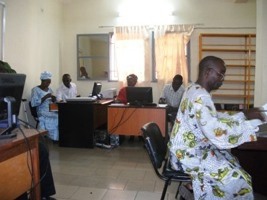The tight-knit nature of rural Malian villages is quite evident through the interactions that take place in daily life. This closeness is also necessary because of the distances between villages, and how residents depend on one another. One might even say that there is a sense of solidarity that is required during the good times and the bad. These are some of the topics discussed in some of the recent postings by the new bloggers in the Ségou Villages Connection project based in the rural villages of the Ségou region.
Seydou Diarra, a new Ségou Infos blogger in Ngakoro writes in an SMS sent on in July 7, 2011 and published on the Ségou Info French Blog [fr]:

Malian Rural Women. Photo by Seydou Diarra
La solidarité est l’un des éléments incontournables dans la vie quotidienne dans nos villages au Mali. Elle s’illustre lors des mariages, des baptêmes et des décès dans les villages et lorsqu’un voisin a des problèmes. Les gestes de la part des autres peuvent être de nature matérielle, morale et même la présence sur les lieux. C’est une des pratiques qui facilite la vie au village

Fallen Truck. Photo by Yaya Coulibaly
Ce matin du 20 juillet 2011, à Cinzana-Gare, un camion remorque s’est renversé à zéro pas d’une habitation non loin du goudron, en voulant éviter les câbles électriques qui flottent au dessus de la route. Il n’ya pas eu de victime.
It is the solidarity with his village in the Ségou region that led Boukary Konaté to start the Ségou Villages Connection project, and the results are also another expression of teamwork by the new participants of the project. The project collects the info from the participants, who send it via SMS, and which is published on the Ségou Info Blog [fr], so that it reaches the maximum number of people not only Malians in Bamako or the Diaspora, but people from around the world. Boukary is working on structuring the submissions sent by SMS to be published automatically.
The trainings that have taken place in the villages has attracted the attention of the National Directorate of Cultural Heritage of Mali (DNPC), a public Malian body that asked the team to provide its staff with a training [fr] in the use of digital media tools. From July 11 to 15, 14 members of the staff from the institution were provided training. Boukary provides additional details about the training:
Des notions navigateurs comme Internet explorer, Mozila Firefox, Google chrome, Opéra, des notions sur la création de comptes mails, d’envoi de mails avec fichiers joints, liens hypertextes, mode de traitement d’images… La formation s’est également portée sur les notions de Google Document, de Google groups et les notions d’animation de blogs. Les six jours de formation ont permis aux participants de mieux découvrir les réseaux sociaux comme facebook et tiwtter et le rôle que ces réseaux peuvent jouer pour relayer les informations déjà publiée sur le blog professionnel du service.

Training with DNPC staff
You can also follow their latest news via Twitter (@toujourspassage) or Tumblr account [fr] or even enjoy the pictures they take during their journeys on Flickr .




2 comments
Est quelque chose de mieux WordPress pour la construction d’une présence sur le web pour une petite entreprise?